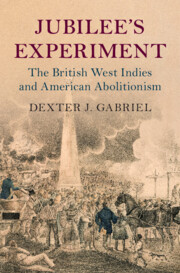Book contents
- Jubilee’s Experiment
- Slaveries since Emancipation
- Jubilee’s Experiment
- Copyright page
- Dedication
- Contents
- Figures
- Acknowledgments
- Introduction
- 1 The Anxieties of Emancipation
- 2 Fears of British Emancipation in America
- 3 The Benefits of Free Labor
- 4 The Problems of Apprenticeship
- 5 The Experiment and Its Challenges
- 6 Reform and the Experiment
- 7 African Americans and British Emancipation
- 8 A West Indian Jubilee in America
- Epilogue
- Index
5 - The Experiment and Its Challenges
Published online by Cambridge University Press: 30 March 2023
- Jubilee’s Experiment
- Slaveries since Emancipation
- Jubilee’s Experiment
- Copyright page
- Dedication
- Contents
- Figures
- Acknowledgments
- Introduction
- 1 The Anxieties of Emancipation
- 2 Fears of British Emancipation in America
- 3 The Benefits of Free Labor
- 4 The Problems of Apprenticeship
- 5 The Experiment and Its Challenges
- 6 Reform and the Experiment
- 7 African Americans and British Emancipation
- 8 A West Indian Jubilee in America
- Epilogue
- Index
Summary
The chapter provides a transnational perspective on how the apprenticeship’s end caused new challenges for the free labor experiment, as British West Indian colonial economies faltered in the 1840s and former slaves asserted their rights as working people. In their pursuit of expanded liberty, black West Indians forced American antislavery to examine the limitations of a strict free labor ideology, and to envision the experiment’s success on other terms, as the issue of slavery moved to the center of national politics.
Keywords
- Type
- Chapter
- Information
- Jubilee's ExperimentThe British West Indies and American Abolitionism, pp. 164 - 194Publisher: Cambridge University PressPrint publication year: 2023

